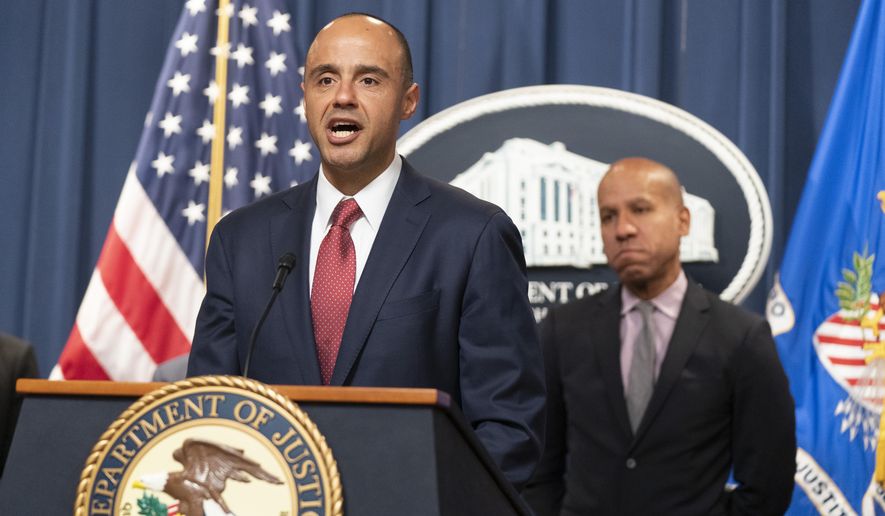A federal prosecutor who IRS whistleblowers accused of shielding Hunter Biden from tax fraud charges in Washington said he never stood in the way of prosecuting the president’s son.
U.S. Attorney Matthew Graves told House investigators that special counsel David Weiss could have charged Hunter Biden in Washington with tax fraud and would have received administrative help from his office to do so.
In a transcript of the closed-door interview on Oct. 3, Mr. Graves said he declined to partner on the tax fraud case with Mr. Weiss, who was then Delaware’s U.S. Attorney. Mr. Graves also said he was not interested in bringing the charges himself against the president’s son.
The Washington Times reviewed the transcript.
His statements back up testimony from IRS whistleblowers, but Mr. Graves contends that he did nothing to block Mr. Weiss from bringing charges in the nation’s capital, as the whistleblowers also contend.
Mr. Weiss called Mr. Graves directly in late February or early March 2022 to say he wanted to bring a case tax fraud case against Hunter Biden in Washington, according to Mr. Graves’ testimony.
The charges involved $124,000 in unpaid taxes from roughly $1 million in income Hunter Biden received in 2014 while serving on the board of Ukrainian energy firm Burisma.
Mr. Graves is a Democratic donor and former Democratic presidential campaign staffer whom President Biden nominated to U.S. attorney.
Mr. Graves told House investigators he never personally reviewed the documents in the case involving Hunter Biden and assigned underlings to help determine whether his office should get involved.
Three weeks later, he decided not to partner with Mr. Weiss or file charges himself in the Hunter Biden tax fraud case.
Mr. Graves refused to tell lawmakers why he made that decision, citing an ongoing investigation. He also declined to provide the names of the individuals in his office who worked on the decision with him.
Critics say the move was intended to shield the Bidens from a case that may have exposed evidence of influence peddling involving Mr. Biden when he was vice president in the Obama administration.
According to the transcript, Mr. Graves never followed up with Mr. Weiss directly or made it clear to his staff that they should tell Mr. Weiss he “was still welcome to bring charges” in Washington or that he would provide support for the prosecution.
“We had already made that clear at the outset, so I didn’t feel like I needed to give the instruction,” Mr. Graves told House investigators. “And based on what was happening, I knew that there was no reason that I needed to give that instruction again.”
According to Gary Shapley, a senior agent in the IRS’ Criminal Investigation Division, Mr. Weiss told them Mr. Graves would not bring a case against Hunter Biden on the tax fraud charges nor would he partner with Mr. Weiss on bringing charges there.
Mr. Shapley said the decision by Mr. Graves essentially killed the tax fraud case, which was running up against a statute of limitation that has since expired.
Mr. Graves told lawmakers he did not believe his role in the decision created a conflict of interest but acknowledged he is a Democratic donor and worked for several Democrat campaigns including advising the Biden campaign.
Despite his resume, Mr. Graves downplayed his campaign roles.
He vetted vice-presidential candidates for the John Kerry campaign and had no direct interaction with the campaign staff, he said.
He did not even consider relegating the Hunter Biden matter to his principal assistant U.S. attorney.
“There was no conflict of interest and no reason for me to do so,” Mr. Graves said. “We have investigations all the time … of individuals who are members of the administration. … A family member of the administration? I don’t see it as necessarily a conflict of interest or perception of a conflict of interest.”
He also told investigators Mr. Weiss was not free to bring charges against Hunter Biden on his own, in direct contrast to testimony and public statements from Attorney General Merrick Garland.
Mr. Graves said in order for Mr. Weiss to get time in front of a D.C. grand jury, he would need logistical support and to work in conjunction with the U.S. Attorney’s office in the District.
Mr. Weiss needed the approval of the Justice Department’s Tax Division.
Mr. Garland told Congress, and said later in public statements, that Mr. Weiss was free to charge Hunter Biden anywhere.
“He was given complete authority to make all decisions on his own,” Mr. Garland said at a press conference in June.
• Susan Ferrechio can be reached at sferrechio@washingtontimes.com.




Please read our comment policy before commenting.